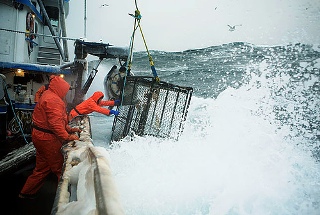Watching the Discovery Channel the other night, I got hooked on another episode of “Deadliest Catch.”

Long considered one of the most dangerous jobs in the world, these crab fisherman risk the treacherous Bering Sea for the boat-load of money they can catch in a short season – as much as $60,000 – $70,000 per deck-hand. The crews are a hardy group of veterans and “greenhorns” skippered by men who have saltwater in their genes and the necessary instinct to know where the crab are.
In one episode, Sig Hansen, captain of the Northwestern, has to make a course correction due to some unexpected conditions. You don’t mess with storms in the Bering. Boats and men have disappeared in record time. When a cameraman wonders why Sig doesn’t just consider pushing through the storm rather than change course, the veteran captain says something like, “That’s a good way to die.”
I was thinking about this when I channel surfed during a commercial to a news channel just in time to hear a politician explain how,“We’ve got stay the course!” on some issue. It was one of those moments where a real-life politician was juxtaposed with that of a real-life crab boat captain, and the latter clearly understanding the importance of knowing when to alter plans when conditions change.
Of course, this also brings up another popular, political idiom, “Flip-Flop.” The term is frequently used to describe a sudden reversal in policy or opinion. The expression is meant to suggest a lack of leadership because he or she is inconsistent and therefore, lacks the necessary judgment to lead.
Tell that to Captain Sig.
He’d probably laugh and remind you – graphically – who the captain of the boat is.
But there’s some real-life ethical insight on display in “Deadliest Catch.”
All of these men are out there for the glory of the catch and the money it brings. None of them would deny it. But you can also see that safety is their first priority.
In looking at the show from an ethical perspective, I was surprised at how much of the captain’s decision-making is rooted in ethicist Michael Josephson’s Five Steps to Principled Reasoning:
Clarify – Determine precisely what must be decided. Formulate and devise the full range of alternatives. Eliminate patently impractical, illegal and improper alternatives. Force yourself to develop at least three ethically justifiable options. Examine each option to determine which ethical principles and values are involved.
Evaluate – If any options require the sacrifice of any ethical principle, evaluate the facts and assumptions carefully. Distinguish solid facts from beliefs, desires, theories, suppositions, and opinions which might generate rationalizations.
Decide – After evaluating the information, make a judgment about what is or is not true, and about what consequences are most likely to occur. If there is an ethical dilemma, evaluate the viable alternatives according to personal conscience, prioritize the values so that you can choose which values to advance and which to subordinate and determine who will be helped the most and harmed the least. It is sometimes helpful to consider the worst-case scenario.
Implement – Once a decision is made, develop a plan on how to implement the decision in a way that maximizes the benefits and minimizes the costs and risks.
Monitor and Modify – An ethical decision-maker should monitor the effects of decisions and be prepared and willing to revise a plan, or take a different course of action, based on new information. Since most decisions are based on imperfect information and “best efforts” predictions, it is inevitable that some of them will be wrong. Those decisions will either fail to produce the consequences anticipated or they will produce unintended and/or unforeseen consequences.
Bottom line: An ethical decision-maker is always willing to adjust to new information no matter what others think.
And that’s what true leadership is all about.
Or, as Captain Sig might say, “…you don’t like it, get off!”
Comments










